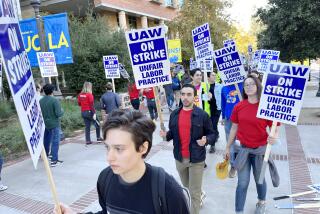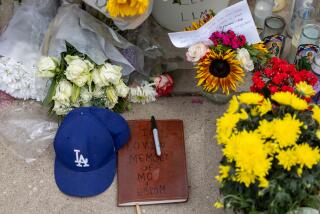Buyout of Homes Near LAX Stalls
The Panamanian woman who used to leave fruit and flowers at Brenda Underwood’s door moved long ago. So did the teenagers who baby-sat Belinda King’s three kids. The family who lived next door to the elementary school isn’t around either to throw wayward balls back to the children.
Bookkeepers, real estate agents and retirees who call Manchester Square home are losing their neighbors one by one. Those who remain in the tiny residential area east of Los Angeles International Airport are surrounded by vast vacant lots ringed with chain-link fence. For many, their nearest neighbor is now at the other end of a street lined with empty homes.
Neighborhood residents and the city agency that operates LAX agreed several years ago to a voluntary buyout program to raze this once-thriving community. The airport agency planned to replace it with a facility where airplanes would unload cargo.
But scores of property owners, ready to relocate as soon as possible, now worry that the city might abandon the buyouts. That would leave them stranded in a half-empty neighborhood that is in serious decline. The reason for the concern: Last month’s terrorist attacks prompted city officials to reexamine all financial commitments, including the ongoing removal of homes from Manchester Square.
The neighbors’ concerns came to a head when the Airport Commission voted this month to defer a $15.5-million request by the airport agency to buy 28 of the properties. Commissioners said the agency needs more time to determine whether it can afford programs that predated Sept. 11.
Commission President Ted Stein suggested that the $315 million set aside to buy and remove homes at Manchester Square might be better used to pay for security upgrades at LAX. About 35% of that money has already been spent.
“It’s wrong for them to do this and make these people victims of what happened in New York and Washington, D.C.,” said David Brown, a former resident who helped organize the buyout program.
The commission’s decision to put the program on hold has thrown scores of residents’ lives into disarray. Some were waiting for escrow checks from the airport agency, while others were awaiting appraisals or offers on their homes, said Jeanne Breunig, a consultant hired by the airport agency to help residents through the program.
Speaking at a recent neighborhood watch meeting, Breunig assured dozens of angry property owners that airport officials intend to follow through on their promises.
“We support this program 110%,” Breunig said. “We recognize that we’ve come in and changed your community--and changed it unalterably--and we can’t go back. We want to finish what we started.”
When they moved to Manchester Square--a 143-acre area bordered by Arbor Vitae Street on the north, La Cienega Boulevard on the east, Aviation Boulevard on the west and just shy of Century Boulevard on the south--residents knew jets would roar overhead so often that they would be forced to pause in mid-sentence to finish their thoughts.
Drug Deals, Gunshots
Many homeowners say the neighborhood of playing children and close friends began to change about 15 years ago, with a rezoning that allowed apartment buildings to be constructed on the perimeter of the community. Some of the renters were less attached to the neighborhood, they said. Drug sales became more common. One resident described how gang members chased each other across her lawn.
Ward King’s home fronts an alley where drug deals take place on a daily basis. King had hoped to sell his house to the airport agency this fall and retire from his job in the printing office at Northrop Grumman Corp.
But the commission’s decision to put the $323,000 purchase on hold left King, his daughter Belinda and her three children--all of whom live in the house--in limbo. It also forced him to postpone retirement.
Belinda King said the family needs to sell the house soon to provide a more stable environment for her children.
“My house is only worth something to the airport,” Belinda King said. “My dad is going through the buyout as the homeowner, but this is my inheritance; it’s my ticket to a safe environment and it went down the drain with this vote.”
Belinda King said she and her children often scramble to hide behind her bed as gunshots ring out around their gray stucco house. A few months ago, she confronted a burglar trying to break into one of the few other homes in the neighborhood that is occupied.
“I’ve gotten used to the noise over the years,” Ward King said. “But the gangs I can’t get used to.”
Members of many gangs visit Manchester Square to buy drugs, residents say. Indeed, the growing crime rate, coupled with noise and pollution from low-flying airplanes, are what led residents here to ask in the late 1990s that the city agency that operates LAX buy their homes.
The airport agency agreed. The money for the purchases comes from a $3 surcharge on each airline passenger’s ticket--permitted by federal law to allow airports to soundproof homes and provide other relief in high-noise areas.
Those who want the program to continue believe they have the law on their side. Diverting the “passenger facility charges” to other uses, such as airport security, is not permitted under the law, they said.
To date, the Airport Commission has approved the purchase of 261 of Manchester Square’s 568 properties. To make the program more efficient, the agency buys properties in small batches. Commissioners must approve each group before officials can issue escrow checks.
Airport officials said they would prefer to buy homes street by street and demolish them in groups. But because the program is voluntary, residents are often left living in homes surrounded by vacant land and empty houses.
In addition, the airport has slowed the plan to demolish homes it’s already purchased, hoping nonprofits will buy these residences for $1 each and relocate them. Until they’re sold, the airport agency lights these homes at night and mows the lawns, airport officials said.
Residents say the program, which also pays moving and relocation costs, has helped many Manchester Square property owners move into nicer areas with better schools and a higher quality of life.
But they say the program has become less efficient. Buyouts that once took three months were dragging on for eight months or more before the commission’s vote put them on hold altogether.
The feeling of being abandoned in a neighborhood that is in demise weighs heavily on many residents, particularly seniors, said Redd Anderson, a real estate agent and 28-year resident who helped organize the buyout program.
“When you take the sense of ‘neighbor’ out of ‘hood,’ you lose control,” she said. “My seniors are scared, and they’re proud people; they don’t need to be scared.”
Neighborhood Lacks Neighbors
Other Manchester Square homeowners echoed Anderson’s concerns.
“I have no neighbors, and what I liked about the place was the neighbors,” said Underwood, a 10-year resident. “It’s not that comforting to me to know that no one is around.”
Underwood was waiting for the results of an appraisal she ordered over the summer for her two-bedroom, one-bath home when the commission’s decision suspended the buyout program.
Along with the anxieties of being left behind, the remaining residents face pragmatic concerns, such as about the rats that migrate from demolished houses into the ones that remain and the trash that gets dumped into vacant lots. City officials said residents need not worry that they will be abandoned.
Mayor James K. Hahn’s office said his seven-member Airport Commission will reconsider its decision to put the program on hold at its next meeting, Tuesday. “The mayor’s committed to see this program get back to normal in the very near future,” Deputy Mayor Matt Middlebrook said.
Commission President Stein said the delay in some of the home purchases was needed only so the panel could review its financial situation since the Sept. 11 terrorist attacks.
“We have every intention of acquiring the properties that we’ve contracted for,” Stein said. “It’s a matter of timing. It’s a miscommunication. People thought ‘defer’ means it’s not going to happen, when it meant we were going to take a look at all our cash flows.”
More to Read
Start your day right
Sign up for Essential California for news, features and recommendations from the L.A. Times and beyond in your inbox six days a week.
You may occasionally receive promotional content from the Los Angeles Times.






